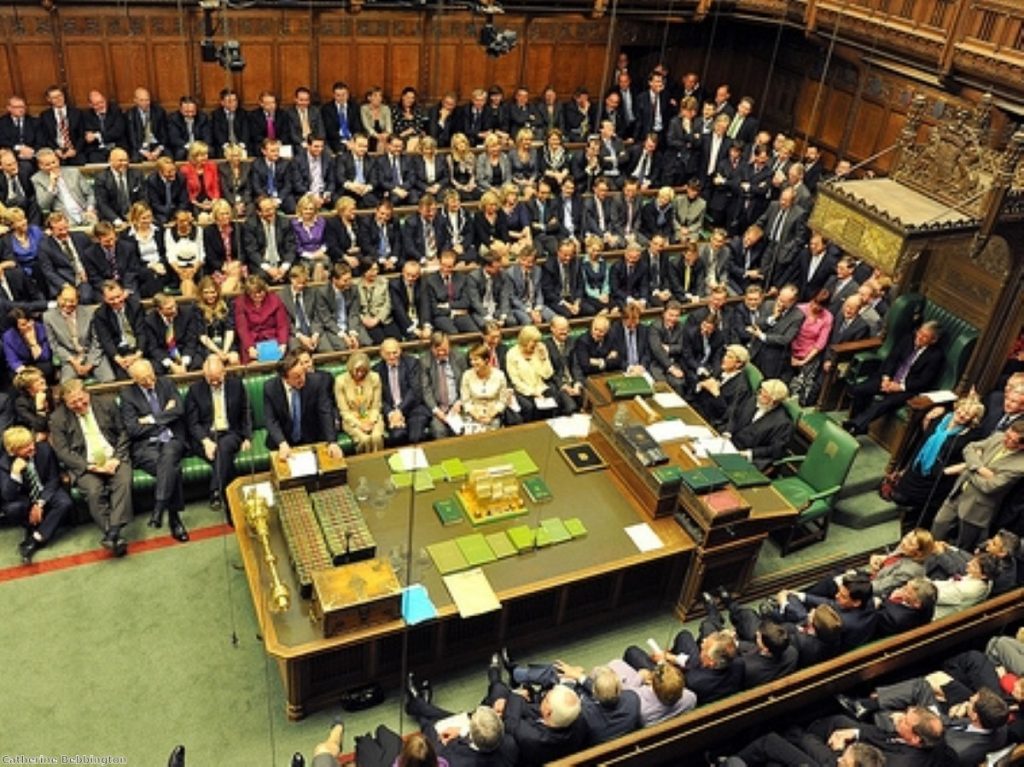Sketch: Catch-up Cameron’s desperate olive branch
David Cameron, determined to defuse the phone-hacking scandal, believes getting politicians to gang up on journalists will save his skin. The tepid reception MPs gave him this lunchtime suggests it's not working.
By Alex Stevenson Follow @alex__stevenson
If you're a Conservative MP reading that last sentence, you'll probably be outraged – and a little hoarse. The government backbenches did their best to signal their support for the prime minister, cheering defiantly on as the thwarted Speaker John Bercow demanded that they calm down. "Anyone might think there's orchestrated noise taking place," he said, full of suspicion. And they were right. The whips weren't actually waving their arms to get the audience participation going, but the effect was the same.
What mattered for the prime minister wasn't the setpiece moments, when he would have got a supportive cheer regardless of what he said. What mattered were the moments when his strategy, now becoming clear, was tested for the first time. The initial results don't look good for Downing Street.
One of these key moments came at the end of PMQs, when a Tory backbencher called Gavin Barwell asked a partisan question about whether Gordon Brown had really bothered to try to set up a phone-hacking inquiry.
Rather than playing the man, Cameron actually decided to play the ball.
"In public life we all are subjects to huge amounts of extra scrutiny and that's fair," he said.
"But it's not fair when laws are broken. We've all suffered from this and the fact is we've all been too silent about this. Your bins are gone through by some media organisation but you hold back from doing anything about it because you want a good relationship with the media."
Well, that was unexpected. I wondered whether Keith Vaz was about to spring up from his seat and whip out a violin.
I was disappointed. There was no 'hear hear' at the end of these tear-jerking remarks, only disparate, discontented heckling from a few Labour backbenchers. Cameron's gambit, trying to unite politicians together against the media, didn't appear to be working.
The reason that Labour MPs aren't buying it was clear enough from the content of Ed Miliband's questions half an hour before: Andy Coulson. Miliband, whose leadership may have been rescued from the brink by the phone-hacking scandal, revelled in Cameron's decision to take on former News of the World editor Andy Coulson. "He should apologise for the catastrophic events," Miliband demanded sombrely, repeating last week's Eeyore tactic. In his dark purple tie he resembled someone addressing a funeral, not the Commons. "You are innocent until you are proven guilty," Cameron tried desperately in response. I don't need to tell you what Labour MPs thought of that.
In his statement announcing the inquiry's terms of reference, the prime minister tried another inclusive ploy to dampen down partisanship wherever it sprung up. Anyone caught involved in wrongdoing "must also have no future role in the running of a media company in our country", he said. Note the 'our', pointedly referring to the fact that Murdoch is very much not a British citizen.
Even when faced with Miliband's unremitting politicking, Cameron sought refuge in his new strategem. "It's good the House of Commons is going to speak with one view" was one of his first comments. He is a late convert to Murdoch-bashing, but now appears keen to make up for lost time. "What has happened at this company is disgraceful," he thundered shortly afterwards. He has become suddenly impassioned with the artificial air of a parent rebuking a naughty child. "They should stop thinking about mergers when they need to sort the situation they've created."
His efforts were all the more unsuccessful for the fact that Cameron tried to have his cake and eat it too. "I can stand here and ask questions about Tom Baldwin," he suggested, to Tory cheers. The Labour spin doctor, who used to write for the Times, was conspicuous in his absence in the press gallery. That was the low-brow party political point made; now it was time to seize the moral high ground. He could mention Baldwin, he explained. But "I think the public want us to rise above this".
This holier-than-thou attitude appears to be one of calculated political position, rather than being motivated by a great moral calling. Why else would Cameron have conceded to ex-culture secretary Ben Bradshaw, when he could have bashed the Labour government, that the failings were "frankly not just of the last government, but the last opposition" – his opposition – as well?
The Tory backbenches, who despite their theatrical cheering remain as downcast as ever, didn't like this one bit. When Miliband goaded them by claiming that "the government has now decided to follow our advice" the reaction was grumbling, not scorn. But there's nothing they can do about it.
The PM is at the start of a long-term strategy which, once the inquiry is wrapped up, could well reveal it's the entire media which is rotten – and not just News International. The more he can persuade MPs to join together against the journalists, the less attention will be paid to his unfortunate decision to hire one of Murdoch's alleged villains. It could pay off in the long-term – but for now it looks very, very ugly. On press regulation, he pleaded with Miliband at one stage, "I hope we don't get into a sort of bidding war".
Miliband stared straight back at him, looking like nothing in the world would make the leader of the opposition blink now.





-01.png)